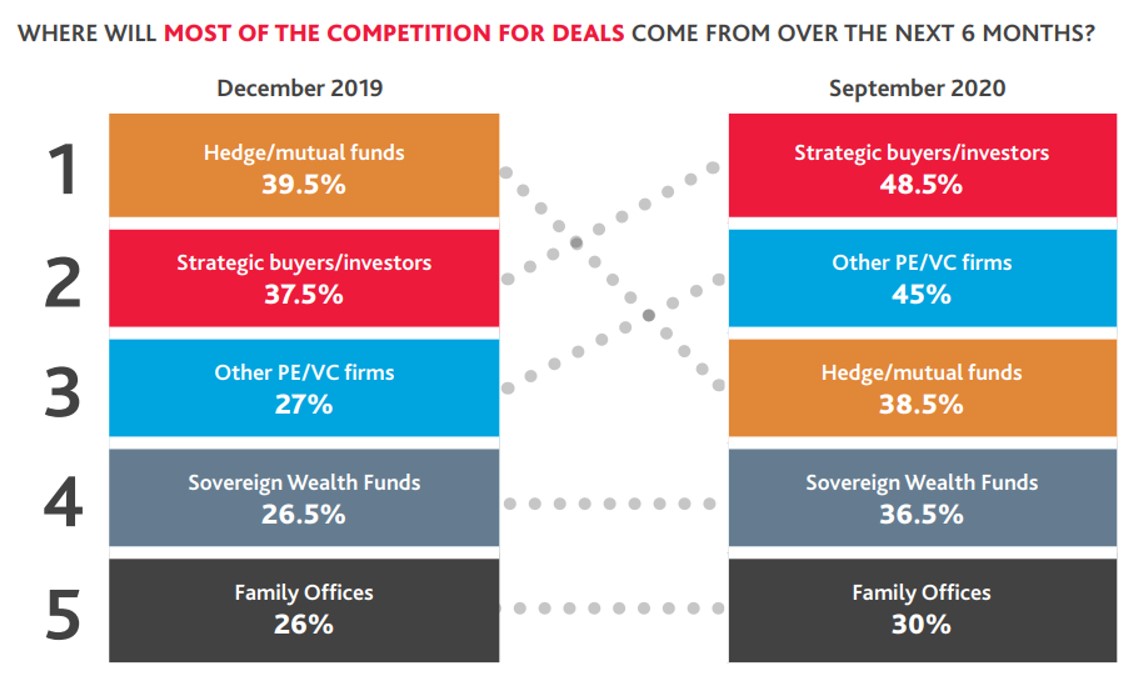Private equity funds have become far more cautious about seeking new deals over the next six months than was the case a year ago, chastened by worries about COVID-19’s economic fall-out, a study shows. Separately, family offices have gotten more important as a source of competition for private equity deals.
The US Private Capital Pulse Fall 2020 Survey from BDO USA, the accountancy and professional services firm, said that “funds today are decidedly more bearish on pursuing new deals than they were last winter.” Some 23.5 per cent of fund managers say they will direct the most capital toward new deals or investments in the next six months. That represents nearly a 20 per cent decline from BDO’s last survey released in December.
The firm surveyed 100 private equity fund managers and 100 venture capital fund managers at US firms. The survey was conducted by Rabin Research Company, an independent marketing research firm, in August 2020.
Family offices, ultra-high net worth and some HNW individuals (depending on wealth minimums) have increasingly pushed into private equity and other illiquid asset classes, chasing the superior yields that can come with lower liquidity. Disruption to global economies caused by the pandemic has created distressed valuations – which can be opportunities – and hampered some of the due diligence checks investors make, so this publication understands.
The chart below shows how family offices' involvement in private equity has increased:

Source: BDO.
Among other findings in the report, three quarters (74.5 per cent) of fund managers believe the economy will be “better” to “much better” in 2021. On the other hand, only 4.5 per cent of respondents said that they are not preparing for a second wave of the pandemic; the rest are taking action, including conducting business continuity risk assessments (55 per cent), changing forward-looking valuation metrics (47 per cent) and considering applying for a government loan (36.5 per cent).
“With the road to recovery shrouded in uncertainty, deal makers are grappling with an unfamiliar landscape,” Scott Hendon, national leader of private equity at BDO, said. “Deal flow will remain comparatively muted for the balance of 2020, but, in line with industry expectations, we believe M&A will pick up as the economy turns around in 2021.”
The report delved into what drives deal flow. It said that while activity during the balance of 2020 is unlikely to catch up with the deal flow in 2019, transactions are picking up steam, and nearly half (49.5 per cent) of survey respondents expect private company sales and capital raises will be the key driver of deal flow in the next six months. Among other top key drivers of deal flow are public to private transactions (39 per cent), succession planning (37 per cent), exiting investments (34 per cent) and corporate divestitures (32 per cent).
More fund managers unsurprisingly think that distressed business deals will drive deal flow. In the latest survey, 46.5 per cent of managers think these areas will be a big source of transactions, up from 40 per cent a year ago.
“We expect to see distressed deal activity pick up in Q4 2020 and into 2021 as businesses that are still experiencing disruption deplete their coronavirus federal relief loans,” the study said.
Other details
Asset prices in private equity deals have fallen by 10 to 20 per cent from pre-COVID levels, except for some sectors.
New deals/investments are still the top choice for capital deployment (23.5 per cent), down by 18 per cent from last winter, and only slightly edge out add-on acquisitions/follow-on investments (22.5 per cent).
Investing in distressed businesses (20 per cent) and applying equity relief to portfolio companies (19.5 per cent) closely follow. The close results point to funds diversifying strategies in the pandemic economy. In the next six months, just 13.5 per cent say they are de-levering portfolio companies’ balance sheets.
General partners are pivoting to venture-focused investments of early stage VC (62 per cent) and late stage VC (45 per cent), as well as growth equity (57 per cent). Other popular investment strategies being employed are structured credit (31 per cent), leveraged buyout (24.5 per cent), private investment in public equity (20 per cent), investments, and mezzanine deals (12 per cent).
